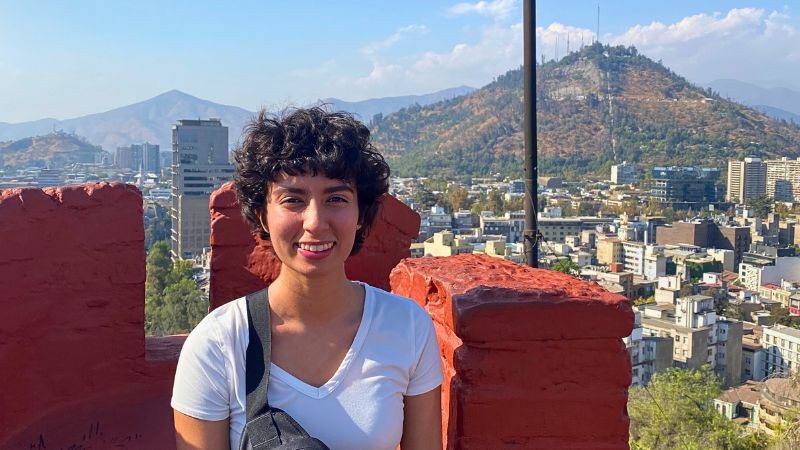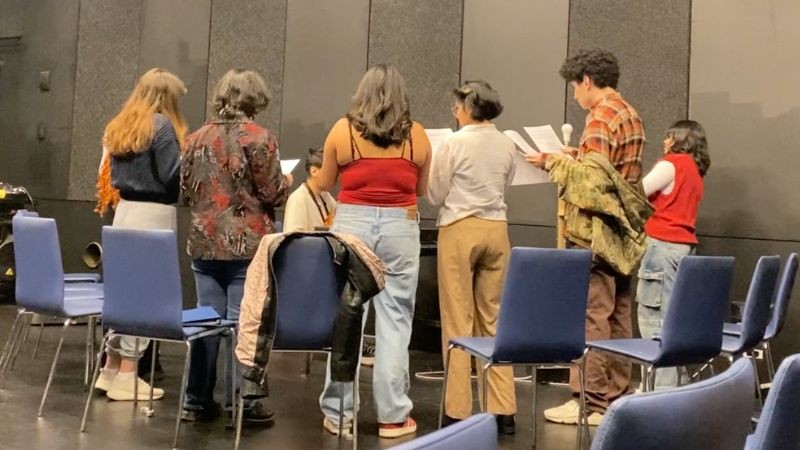History on Stage: A Barnard Student Playwright's Tribute to Chilean Music
Izabella Lizarazo wrote a musical about the Nueva Canción Chilena. It debuts on stage in April.

*Update: Izabella's play, titled 'No Hay Revoluciones sin Canciones' and directed by Susana Santiago (SEAS’25), premiered on April 4 to resounding success. Tickets sold out within minutes for all four performances, allowing several hundred people to experience a captivating blend of musical and biographical material. The play delves into the lives of six Latin American artists who played pivotal roles during the tumultuous 1960s and 1970s in the region.
In the southern-hemisphere winter of 2023 we met Izabella Lizarazo (BC'24), a Barnard College senior majoring in Political Science and Spanish & Latin American cultures that was studying in Santiago. Inspired by a class she took at Columbia taught by a Chilean graduate student, she had to applied to the Consortium for Advanced Studies Abroad (CASA) program and visit Chile with the aim of deepening her knowledge of its people, history, politics, and culture.
She didn’t tell us back then, but she was mid-way through her research to write a play about the Nueva Canción Chilena, a widely popular Chilean political and social music movement of the 1960s and 1970s. A blend of traditional folk music that combined protest lyrics with catchy melodies, the Nueva Canción movement spread throughout Latin America and played key roles in political movements across the region.
Once her play was finished, she applied to a playwright contest run by NOMADS (New And Original Material Authored and Directed by Students), one of two clubs at Columbia that encourage Columbia and Barnard undergrads to create new theater, and help them produce and present their writings on stage. She won the contest and is now in the middle of the production of “No hay revoluciones sin canciones" (There Can Be No Revolution Without Song), a musical that debuts at Barnard’s Glicker Milstein Theater in April.
Among rehearsals Izabella found the time to talk to tell us about the story behind her inspiration, her creative and research processes, as well as what she hopes the audience will take away from her play.
How did you come up with the idea to explore the Nueva Canción Chilena movement in your play?
I was introduced to the Nueva Canción Chilena in the spring semester of my freshman year in a class titled “Ritmo, Amor, y Revolución”, instructed by Eduardo Vergara Torres, Chilean PhD candidate at the Department of Latin American and Iberian Cultures (LAIC). We learned about Nueva Canción Chilena, Nueva Trova Cubana, and Nuevo Cancionero Argentino, and how these musical movements worked both in harmony–and at many points, in contention–with leftist political movements and governments. The songs captivated my interest because they captured different facets of our humanity, including our desire for better living conditions and better governance.
Even after the class ended, I continued listening to singers like Víctor Jara and Silvio Rodríguez. As I listened to their songs, I couldn’t help but envision what it would look like on a stage as a means of telling a story–their story. And now, our story.
What message or themes do you hope to convey to the audience through your play?
Through conversations I’ve had with our director, we realized that this play aims to humanize historical and revolutionary events. Too often, historical events are understood simply as “events”, rather than the experiences of the people who are affected. The heart of this story lies within this question: why do we sing? Why do we make art? Why do we protest? Why do we care about what’s happening internationally? It’s because we are HUMAN. Because we care about other people and what’s happening to other people. This play serves as a reminder of our–and others’–humanity.
Another important theme of this play is that even when faced with censorship, with threats– when our convictions are that strong– we will say what we need to say. Especially as college students, we will make our voices heard in the same way these singers made their voices heard and even more so in the face of censorship. As the playwright, I am a firm believer in this, and I’m grateful that the show is being put on in a time when we most need it.
How was the writing process? How long did it take? Did you conduct research only in Chile, or did it extend to the US as well?
I started planning this project in the fall of 2022. I came across an interview of Silvio Rodríguez, where he recounted his memories of Víctor Jara and highlighted a memorable visit to the Peña de los Parra [a cultural and artistic space in Santiago during the 60s which gathered artists, musicians, and intellectuals, including the renowned Parra siblings]. This interview inspired me to set the scene at the Peña de los Parra and have the first act of the play focus on their relationships with one another: their different social and political convictions and their relationship with music. I began in-depth research into their lives, their careers, their relationship with folklore, their political backgrounds, and writing styles, all while still in the U.S.
While I was studying abroad in Chile, I visited different locations, read essays and books, and listened to first hand testimonies to help better inform the play. With my program we visited the Museum of Memory and Human Rights, which portrays the human rights violations perpetrated during the military dictatorship. I visited the Union of Chilean Folklorists and Guitarists and learned more about the importance of folk music throughout Chile’s history, especially in the political context the play is set in. I even had the opportunity to witness a Quilapayún and Inti-Illimani Histórico concert, which was an interesting experience, considering the election for the Constitutional Council [organ elected by popular vote that was to draft a proposal for a new Constitution] had taken place days before. While the music had a hopeful tone, there was an air of uncertainty and disappointment amongst the audience.
The writing process began in August 2023, when I returned from my study abroad. From the start, I envisioned that the second act of the play would be about the experiences of the folk singers through the coup d’états, dictatorships, and difficult periods. So, I began to write monologues, which then blossomed into scenes. While I knew I wanted the first half of the play to be set in the Peña, it took me a while to decide what were the dynamics between each character and what kinds of conversations would take place. I realized how essential Violeta Parra was to Nueva Canción, which made her the center of many conversations. I also realized it was important to demonstrate the nuances in the relationship between Nueva Canción singers and the Cuban government, so I decided to represent these different perspectives and experiences. I finished the script in December 2023.
What is your role in putting the play together? How many people are you working with, and how has the process been so far in selecting the production team and cast?
When I finished writing the play, I submitted it to NOMADS (New and Original Material Authored and Directed by Students) and promptly heard back about the acceptance. With their guidance and support, we held interviews over the span of one week to choose the first members of our creative team as well as our director, producer, music irector, stage manager, dramaturg, and translator.
During the first few weeks of the semester, we held auditions and (more) interviews. We now have a team of over 40 people, and it has been inspiring seeing how many people are interested in being a part of this project. While the play focuses on what happened in Chile, Cuba, and Argentina, this story is international. This is a story about Latine resistance, but it echoes what has happened and what is happening in so many other places in the world. I’m so glad so many people can be involved in its making.
As the playwright, I am constantly re-reading the script and seeing what can be clarified, what can be expanded, and what can be cut. We recently had our first read-through and it was so helpful to hear the script be read out loud for the first time. Going forward, I will be attending rehearsals to take note of what I need to work on. I’m really looking forward to the rest of this process!
How long is the play expected to be exhibited, and do you have any future plans or aspirations related to its production? (such as streaming it online or bringing it to Chile perhaps?)
The play is happening April,4, 5 and 6 in the Glicker Milstein Theatre on Barnard College’s campus! You can follow the play on Instagram to receive updates on when tickets will come out!
As for future plans, I’d love for this play to be able to reach more people in the United States who aren’t aware of what happened to Chile, Cuba, Argentina, and other countries affected by Operación Cóndor [an intelligence operation coordinated among South American dictatorships in the 1970s to suppress political opposition] and U.S. intervention in Latin America. I wrote this play because I think it’s important for us to be aware of the truth of our history, and theatre is a good way of teaching us this. I would not like this play to become commercialized because I think it would contradict the integrity of Víctor Jara’s songs. He was vehemently against the commercialization of the Nueva Canción, and I need to respect that.
I think if the play was to ever be brought to Latin America, I would need to work even more closely with an ethnomusicologist and a historian to make sure the material is as accurate as possible. Even so, I understand that the dictatorship is an extremely sensitive subject in Chile. Given the role played by the United States at the time, it may not be the right place to showcase a play written by a US citizen.
